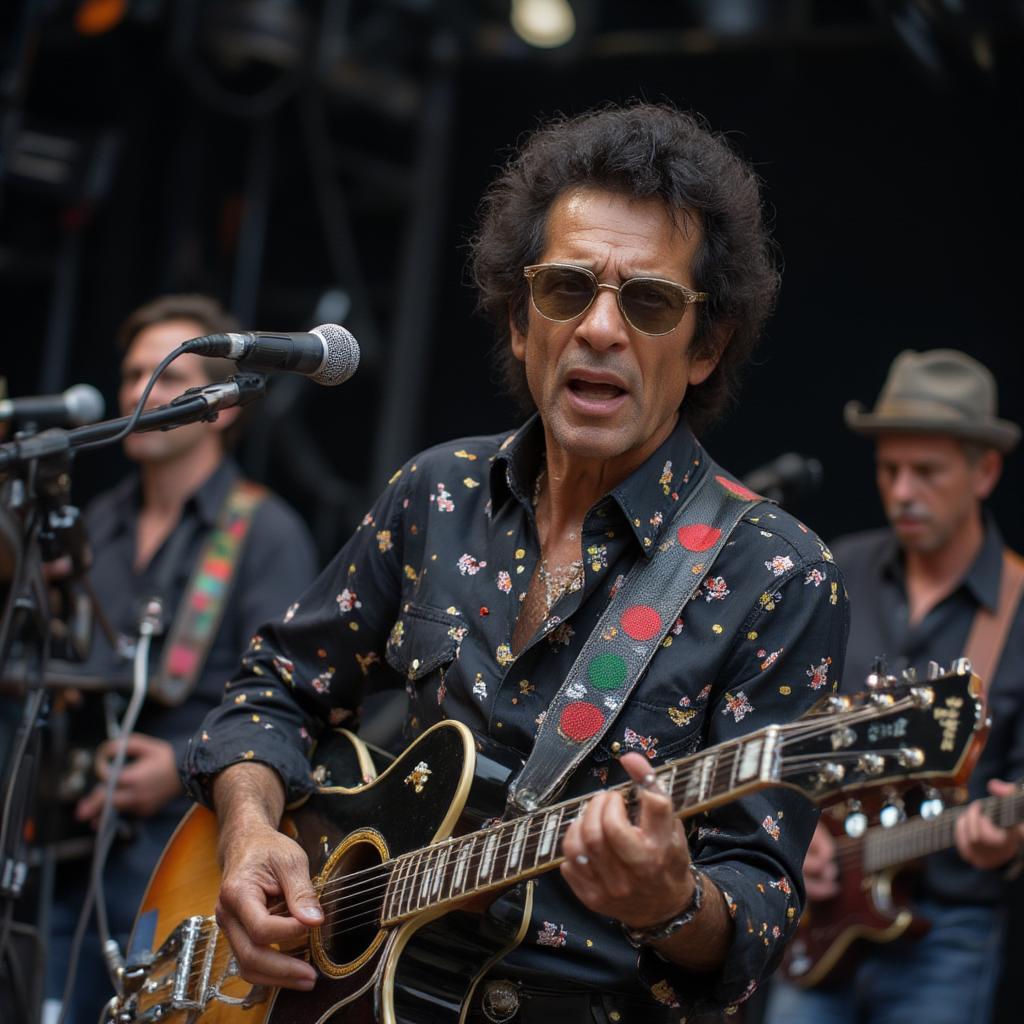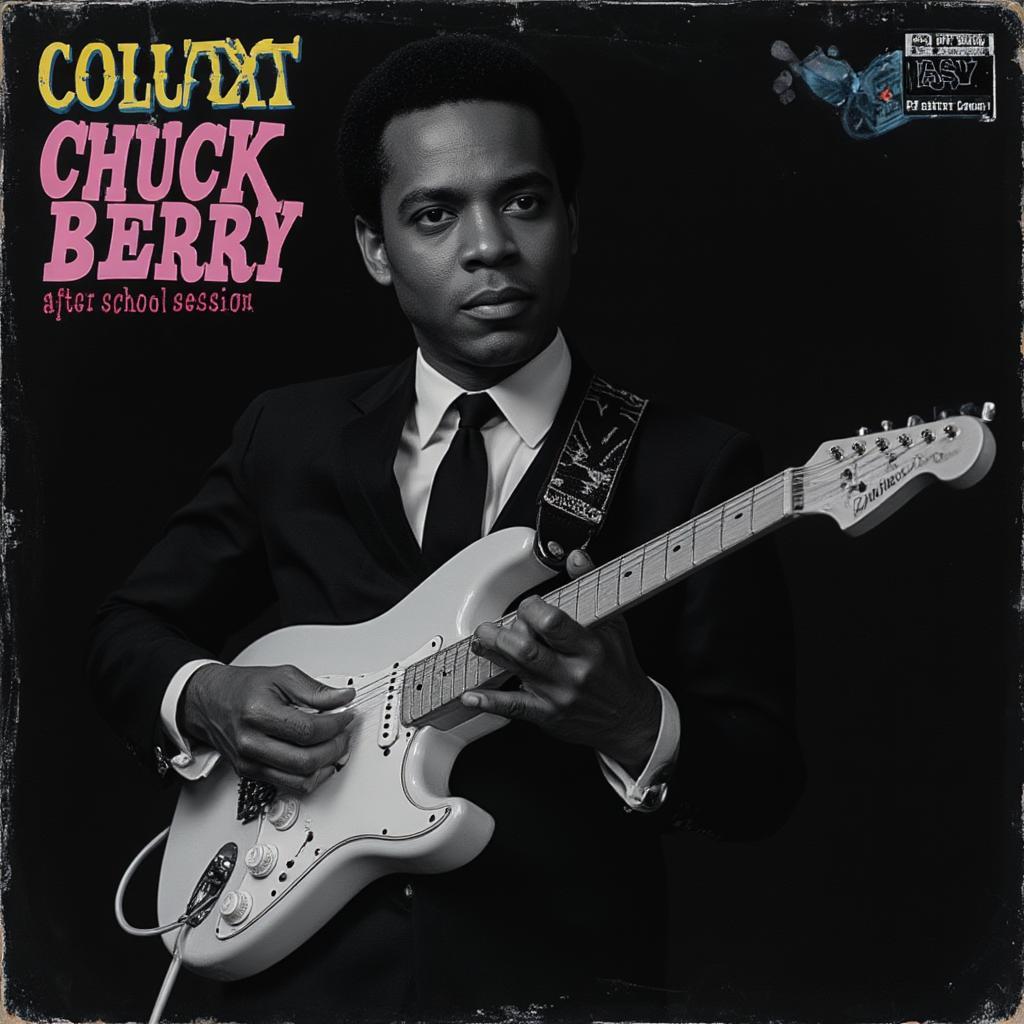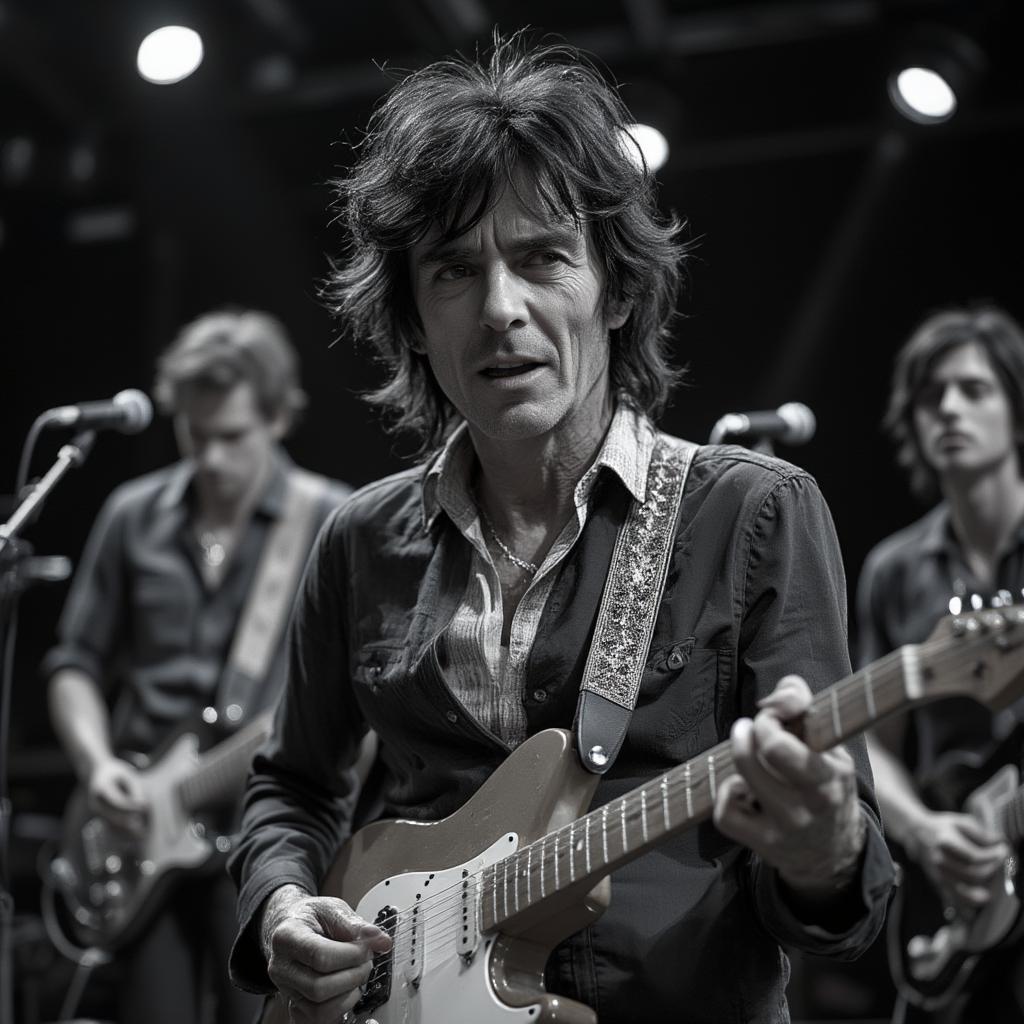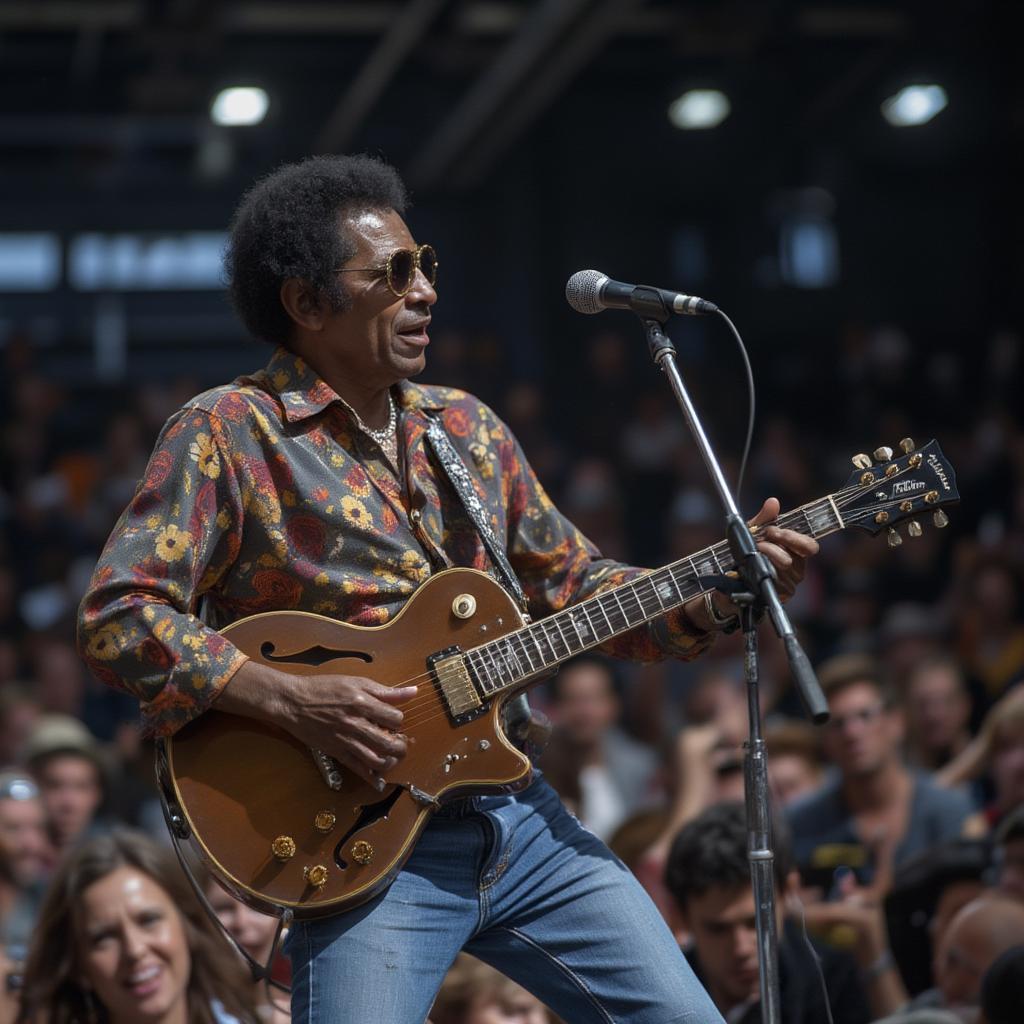The Blues Influence on Chuck Berry: A Rock and Roll Revolution

Alright, cats and kittens, let’s talk about the real deal – the blues and how it got mixed up in my rock and roll. People often think of me as the duckwalking, guitar-slinging architect of rock, and they ain’t wrong, but the foundation, the heart and soul of it all, that’s straight from the blues. That raw emotion, that storytelling, it’s what made my music groove and what made folks get up and dance. The blues wasn’t just a genre for me; it was a language, a feeling, a way to connect with people.
The blues was like the air I breathed growing up. It was in the juke joints, the gospel churches, and even the stories whispered on the streets of St. Louis. The rhythms, the bent notes, the heartfelt lyrics—it all sunk in deep. When I started messing around with my guitar, the blues was right there, a natural part of my sound, although I never saw myself as a pure blues man. I just took that root, that essence, and cranked it up a notch, made it my own, if you dig. I wanted to make it move people, not just make them feel sad. That was the magic of it, you see. I wasn’t trying to be B.B. King or Robert Johnson, I was trying to be Chuck Berry.
The Blues Roots of Chuck’s Riffs
My guitar licks, those iconic riffs that people still try to copy today? Those are straight from the blues, baby. I wasn’t afraid to take those bent notes, that call-and-response style, and give it a little oomph. I wasn’t just copying; I was innovating. I was taking those soulful sounds and injecting them with the energy of a hopped-up hot rod, the swagger of a young man on the town, you know what I mean? Take the lick from “Johnny B. Goode,” for instance – it’s rooted in blues phrasing but sped up, made more urgent. The blues gave me the vocabulary; I just put the words together a little differently. It’s like finding an old car in a junk yard, stripping it down and building a hot rod. That’s what I did.
And it’s not just the guitar work. You hear that same blues influence in the rhythm of my songs. That driving beat, that syncopation – it’s all there in the blues, just with a different coat of paint. I wasn’t playing straight-up 12-bar blues all the time. I was bending those rules, playing with the structure, injecting my personality into it. Think of the way “Maybellene” takes a country shuffle beat and gives it a blues edge—it’s that blend, that fusion, that made my sound so unique. It’s not just the notes you play, but how you play them, the feeling you put into every chord. As the great musician, Willie Dixon once said, “The blues are the roots, the rest are the fruits.” This always resonated with me, it’s what made me, me!
The Storytelling Heart of the Blues in Chuck’s Music
Now, the blues isn’t just about the music; it’s about the stories. Those everyday tales of hard times, love gone wrong, dreams of a better future – that’s the heart of the blues. And I took that same storytelling approach in my songwriting, but I made it more relatable to the youngsters. I wasn’t singing about picking cotton in the fields; I was singing about going to school, cruising in cars, listening to the radio, things I saw every day and things that people around me were talking about. I took those blues sentiments and put them in a new context, in a new language that everyone understood, I wanted to tell stories for my generation, not just the old heads.
For instance, think about “Nadine.” That’s a story, a real-life scenario, set to a rock and roll beat. It’s got that bluesy shuffle rhythm, but it’s also got that youthful energy, the chase after a pretty girl, the thrill of the moment. The blues taught me the importance of telling a story with your music, of making your songs relatable and authentic. I didn’t want to sing about things no one understood, so I took those human blues themes and told them in a way that everybody could sing along to. Like a young man who wants to be a legend, so he makes sure that all of his stories are being heard. Just like rudolph by chuck berry, those songs are about more than just the chords. They’re about life itself.
The Raw Emotion of Blues in My Rock and Roll
Another key element of the blues is raw emotion. Those songs aren’t just notes on a page; they’re feelings poured out through the music. And I made sure that same emotion, that same passion, was front and center in my rock and roll. I didn’t shy away from the grit, the intensity, the things that people were actually feeling in their lives. I didn’t always just sing about good times. I sang about wanting to be someone, wanting to get ahead, wanting things to be better. I took that blues angst and made it into something that you could dance to.
I channeled that energy into every performance, every guitar lick, every lyric. You could feel it in the way I moved on stage, the way I sang into the microphone, the way I let the music take control of me, and, at the same time, I was the one in charge, the one who made the songs come to life. It’s that rawness, that unvarnished truth, that made my music so powerful. It wasn’t just about entertainment; it was about capturing a moment, a feeling, a way of life. When people listened to my music, they felt it, they connected with it. And that connection, that’s what made it stick. People know that I felt what I sang, and that makes the difference. Much like the way chuck berry 1950s captured the spirit of that time.
How the Blues Shaped My Style and Innovation
Now, some might say that I went beyond the blues, that I created something entirely new. And that’s true. But I always say, you can’t have the tree without the roots. The blues was my foundation, it was my starting point. It gave me the language, the tools, the inspiration to create something unique and to push musical boundaries. I took those blues patterns, those blues rhythms, and I bent them, stretched them, molded them into something else, something new.
It was like taking an old car engine and adding some rocket fuel. The basic structure was there, but I made it fly. I added my own swing, my own beat, my own story. That’s how I developed my signature guitar style, that’s how I wrote the hits, that’s how I became Chuck Berry. It was that combination of the blues, the rockabilly, and a whole lot of me, that made it so contagious. As Dr. Evelyn Reed, a musicologist at the St. Louis University, put it, “Chuck Berry didn’t just play the blues; he redefined it in the context of a new era, creating a genre that captured the energy of a generation.” That’s what I aimed to do; change things. And thanks to the blues, I did.
From Blues to Rock and Roll: A Seamless Transition
The transition from the blues to my version of rock and roll wasn’t a sudden thing; it was a natural evolution. It was like watching a river flow into the ocean. The blues was the river, and my rock and roll was the ocean, a vast, powerful force. I never abandoned the blues, I just expanded it, I gave it a new form. It was my way of expressing the change that I saw around me, of capturing the energy of youth, of a new generation finding its voice. This shift wasn’t planned; it was just a natural expression of my feelings about the world around me.
The key for me was always about combining elements, putting different sounds and styles together. Blues with a bit of country, a touch of swing, and a whole lot of energy. That’s what I wanted people to feel – that exciting, driving beat, that sense of freedom and liberation. And the best part is, I think I managed to do that. I showed them how they could move, how they could get involved with the music. It wasn’t just about sitting back and listening; it was about feeling it deep down in your soul. It was a wild ride that’s still going strong. I was just the driver, the guy at the wheel, but the car was powered by the blues.

The Blues Legacy: Shaping the Sound of Rock
The legacy of the blues in my music isn’t just about the past; it’s about the future too. It’s a reminder of where rock and roll came from, of the roots that run deep beneath the surface. And it’s a testament to the power of music to evolve and transform. Every note I played, every lyric I wrote, was a nod to the blues, even if it didn’t always sound like the blues. And the more I went forward, the more the blues became a foundation, a rock that I could always stand on.
The blues is in the DNA of rock and roll, and my music is just one expression of that. It’s that raw emotion, the storytelling, the innovative spirit that I think we all share. As historian, Dr. James Thompson noted, “Chuck Berry’s adaptation of blues traditions into rock and roll was pivotal in establishing the genre’s fundamental sound and lyrical style.” The blues isn’t just a style of music; it’s a feeling, an attitude, a way of life, I made sure that it all was included in my own style. And for that, I’m thankful. Just like how artists like chuck berry elvis and other great musicians have built upon these foundations.
The influence of blues on my music isn’t just a historical fact; it’s a living, breathing force that continues to shape the sound of rock and roll. My music wouldn’t be what it is without the blues, and I wouldn’t be who I am without it. That’s the straight-up truth of it all, and I’m here to tell you about it. Rock on, cats and kittens!
Conclusion
So, there you have it, the real deal about the blues and how it shaped my rock and roll. It’s a story of evolution, of inspiration, and of the enduring power of music. The blues chuck berry connection is deep, it’s authentic, it’s the foundation of everything I do. I took those soulful sounds and gave them a new life, a new energy, a new audience. It was never about leaving the blues behind; it was about building upon its legacy, taking it to new places, letting it be heard around the world. And that’s what I did, I took the blues and showed the world what they could do!
FAQ
-
How did the blues influence Chuck Berry’s guitar playing? The blues provided the foundation for my guitar style, using bent notes, call-and-response, and soulful phrasing, then I sped it up and added my own flair.
-
What specific blues artists influenced Chuck Berry? While not directly copying anyone, I was inspired by many blues artists and the blues music that filled the air and juke joints in St Louis, artists like Muddy Waters, and others.
-
Did Chuck Berry ever perform pure blues music? While my focus was rock and roll, my blues roots were always evident, however, I did not focus on performing pure blues music, it always had a rock and roll edge.
-
How did the storytelling aspect of the blues influence Chuck’s songwriting? I incorporated everyday stories and experiences into my songs, mirroring the blues’ focus on real-life narratives, but made it relevant to the younger generation.
-
How does “Maybellene” reflect the blues influence? “Maybellene” blends a country shuffle beat with a bluesy edge, demonstrating my fusion of different genres and blues-inspired rhythms.
-
Did blues help Chuck Berry create his unique style? Yes, the blues gave me the language, tools, and inspiration to push musical boundaries and to create my own unique sound. Just like in chuck berry bruce springsteen you never can tell we all build off one another.
-
How did Chuck Berry adapt the raw emotion of blues to his rock and roll? I channeled the raw emotion of the blues into my music by injecting every performance, guitar lick, and lyric with passion and intensity.
-
Is there a connection between Chuck Berry and Johnny Cash in their music? While our styles differ, a deep respect and understanding of American roots music connect us. Just as shown in their collaborations such as johnny cash chuck berry they are both masters of their crafts.




